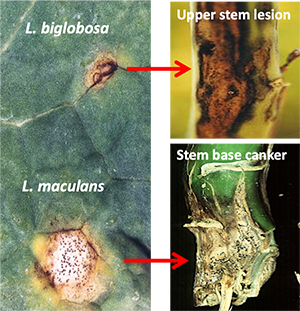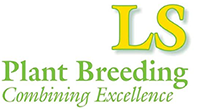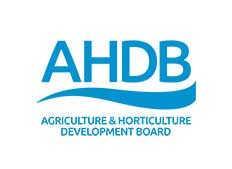Integrated control of Phoma stem canker pathogens
Innovate UK/BBSRC
- Integrated strategies to control phoma stem canker pathogens on UK winter oilseed rape
- Strategies to increase durability of host resistance for effective control of phoma stem canker on oilseed rape
In the UK, phoma stem canker is caused by two closely related fungal pathogens; Leptosphaeria maculans and L. biglobosa. 
Effective control of L. maculans depends on use of major resistance (R) genes that match the corresponding effector (Avr) genes in the local pathogen populations. Selection of virulent pathogen races due to the high potential for mutations in L. maculans reduces the efficacy of the corresponding resistance genes over time.
Additionally, with current control measures mainly focused on L. maculans, L. biglobosa can become an increasing threat to UK oilseed rape production since there are no existing methods to control this pathogen.
Therefore, our current research aims to investigate strategies to increase the durability of host resistance and to investigate the stem canker epidemics caused by L. biglobosa to develop tools/strategies to control both the pathogens.
Project partners
University of Hertfordshire
The project is based at the University of Hertfordshire in Life and Medical Sciences. Staff from the University of Hertfordshire involved in the project. Link to their profiles and publications may be found below.
Industry partners
- Hutchinsons Crop Production Specialists
- Syntech Research
- KWS
- Corteva Agriscience
- Weston Park Farm
- ADAS
- Limagrain UK
- Grainseed Ltd
- Woodhall Estate
- LS Plant Breeding
- Monstanto
Previous funded project
PhomaLink
Welcome to PhomaLink, the BBSRC Sustainable Arable Link project.
The Sustainable Arable Link project aims to decrease the future risk of severe phoma stem canker on oilseed rape by developing a scheme for deploying cultivars with different resistance genes and quantitative resistance by using temperature as a means to improve our understanding of the operation of Brassica napus resistance against Leptosphaeria maculans.
Members of PhomaLink
The project is based at the University of Hertfordshire in the Department of Human and Environmental Sciences. Staff from the University of Hertfordshire involved in the project:
- Professor Bruce Fitt
- Dr Yongju Huang
- Dr Aiming Qi
- Ms Georgia Mitrousia
The project is supported by a consortium of:
Agriculture & Horticulture Development Board
Plant breeders
- Limagrain UK
- Elsoms
- Syngenta
- DSV
- Monstanto
- LS Plant Breeding
- Saaten Union
- DuPont Pioneer
- Grainseed



























